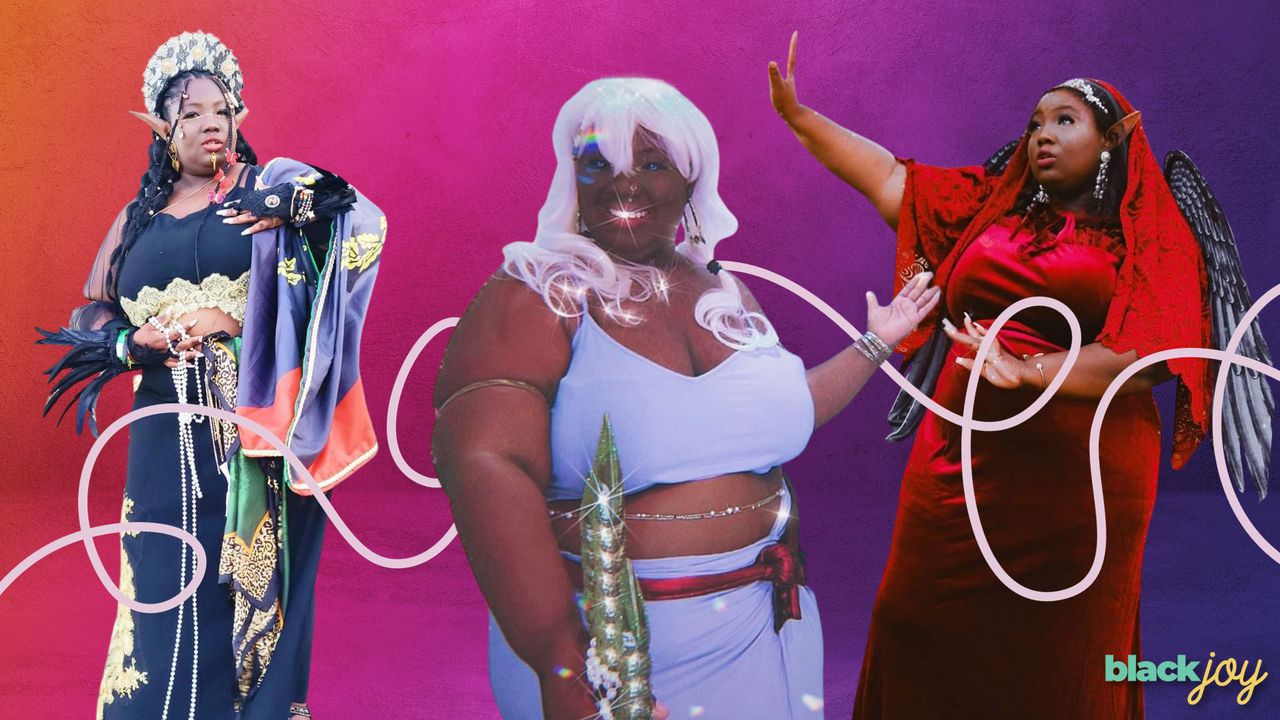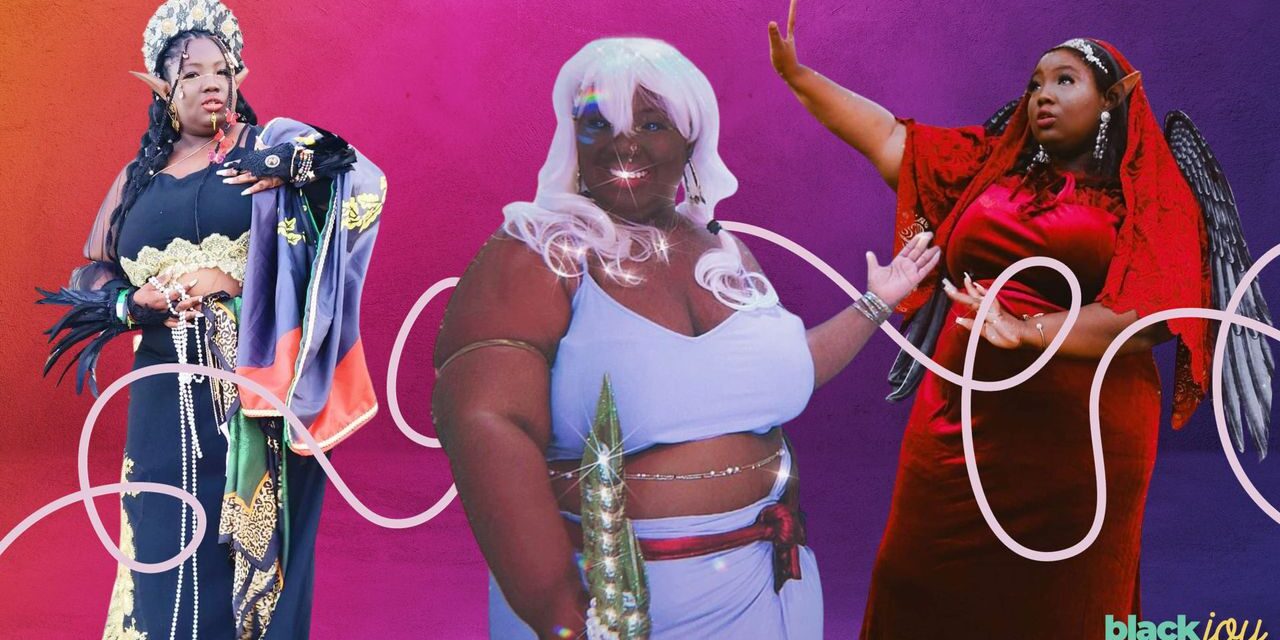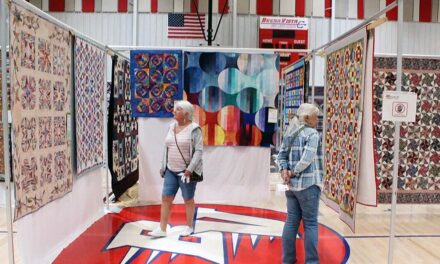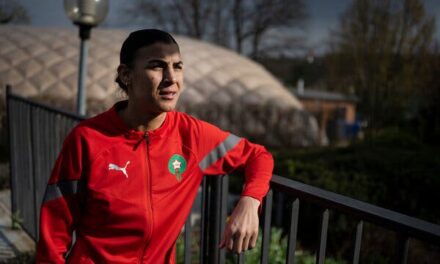
Tinkering with your mental health may equip you with a toolbox of therapeutic practices, like journaling, meditation and breathwork. But what if we turned that toolbox into a toybox – one that allows us to reinvent our worlds through video games like “The Sims” or encourages us to engage in cosplay.
These activities may sound a bit childish to you. But to Niah Singletary it’s a science. Singletary, known as the “cosplaying therapist” Phoenix Luxe, is a doctoral student at North Carolina A&T University in Greensboro, NC. Singletary is raising funds for her dissertation exploring how different methods of play, including cosplay and fantasy culture, can help heal Black people in therapeutic spaces. Intergenerational trauma caused by racial strife can freeze people in a state of survival, but creativity can become the cradle that nurtures our inner child and restores our wellbeing.
“You don’t get too old for joy,” Singletary laughed while wearing an anime T-shirt and gold butterfly earrings. “Your joy is equally as important as your survival. Your joy is going to boost your survival.”
Researchers are ringing the alarm in regards to Black mental health. The suicide rate for Black Americans increased by 30 percent between 2014 and 2019. Racism, lack of access to mental health resources, cyberbullying and stigma are weathering Black people’s wellbeing. Black mental health professionals are leading the charge to educate our communities and create resources remedying this public health issue.
Singletary’s research will expand the boundaries of play therapy, a more than a century-year-old practice that helps children express and communicate their emotions through playtime. This type of therapy is typically reserved for children, but Singletary believes adults can reap the benefits as well by routinely finding time in their day for spontaneity. That could look like flying a kite during a work break, splashing in a puddle, jumping rope with friends, ending a workday with an adult coloring book or dressing up for a child’s tea party.
“I want people to incorporate play in their everyday lives so they don’t create a life they are running away from,” Singletary said. “During the typical work week, people are like, ‘Oh, well on Friday I’m going to do all these things. I can’t wait.’ And then it seems like you don’t have enough time. Stretch it out.”
Singletary believes the mental health field is missing out on discovering healing spaces within the Black and nerd, or “blerd,” community. Nielsen reported that 73 percent of Black Americans 13 years old and older consider themselves gamers compared to 66 percent of the total population. There’s also anime and comic book conventions that center Blackness such as Blerdcon and HBCU Con. Fantasy and anime lovers find safe havens in groups such as Afro Mermaid and the Blerd Society because they’re free of racist trolls.
Black people are already using these spaces as a form of escapism from environments that force them to dodge microaggressions and racial discrimination. Singletary said these activities, particularly cosplay, already mimic therapeutic practices.
“There is an intersection called psychodrama in mental health where you can act out certain scenarios, and I was like, ‘This is kind of like cosplay,’” Singletary said. “So, I really began to talk with other cosplayers and realized to myself that in cosplay you can be anything. You can be your full self.”
But without grant funding and proper research, mental health professionals struggle to learn how to use these different elements of adult play in the therapeutic setting.
“I just want people to kind of see that you can also do this for your healing. It doesn’t just have to be for your entertainment,” Singletary said. “When we don’t have the peer-reviewed research that says, ‘This population benefits from this, and they need this,’ it makes it very hard to get funding for that and to spread joy. That is my long game with this research.”
Singletary first witnessed the healing wonder of cosplay while attending two events near Atlanta in May 2021 for Black Fae Day, an organization pushing for more positive Black representation in fantasy culture by hosting diversity panels at conventions and by encouraging Black people to express their inner magic by role playing as faeries or other mystical beings.
With rainbow-colored butterfly wings draped over her shoulders and butterflies fluttering in her coils, Singletary pranced down a nature trail where the warmth of the sun melted away all the heaviness she felt as a then second-year doctoral student who was still pondering her research project. In just an hour of being in the space, she started recognizing other healing practices happening around her. She saw breathwork as Black people blew bubbles in the air. She spotted somatic exercises as Black fantasy lovers frolicked together. Singletary’s best friend reset their nervous system as they found peace while resting under a tree.
During Black Fae Day’s first fairytale gala, a wedding venue was transformed into the Kingdom Of The Shade, where Singletary observed different expressions of play. Encouraging words filled the air during a fashion show that was open to any melanated faerie or fantasy creature who wanted to shed themselves of their timidness and show off their ethereal looks. Knights of Wakanda, a Black medieval-style armored combat group, displayed their skills and strength. Black mermaids eased people out of their fear of water as they glided alongside fledgling swimmers in a pool.
“There are stereotypes that Black people can’t swim or Black people are afraid of water,” Singletary said. “But to see Black mermaids helping people with their relationship with water and seeing them just gracefully swim in and out and play with people, that was life changing.”
During these moments, Singletary noticed how easy it was to give herself permission to share merriment with other Black fantasy enthusiasts who needed reprieve after 2020 — a year consumed with grief triggered by the loss of Black life due to the COVID-19 pandemic and police brutality.
“Everyone kept saying, ‘It’s like a family reunion,’” Singletary said. “You have all of these people who had never met previously coming together for something outside of trauma. We weren’t gathering because something terrible happened. We weren’t gathering for protests. We were gathering just to enjoy each other, to be relaxed and to dress exactly how we wanted to dress.”
Singletary carried the inspiration she felt during Black Fae Day’s event in 2021 into her therapeutic practice with adults by motivating them to engage in different forms of play, such as taking patients to comic book stores and encouraging them to pick a character who resonates with them. One of Singletary’s clients who didn’t grow up with a lot of money experienced a cathartic release after buying a toy they’ve always wanted for Christmas. Just enjoying the experience of playing with the toy was enough to free the client of their scarcity mindset.
Another client who felt disconnected from loved ones after the passing of a family member found a way to express their grief through joy by starting a holiday tradition of playing board games with their relatives. Every year the entire family can honor the passing of their kin in a communal way that creates a chorus of deep-belly laughs from the client, their mom, their grandma and ‘nem.
Working in a way the centers play as the antidote of trauma helps Singletary console her community without giving them a label.
“I don’t necessarily believe in pathologizing people. Your depression, your anxiety, your diagnosis doesn’t define you,” Singletary said. “We can heal through joy.”
In the case of cosplay, the healing comes from the theatrics of the art form. Since cosplay doesn’t limit the imagination of who – or what – you want to become. Allowing people to take charge of their presents and past. This was the case when Singletary crafted an outfit she believes her ancestors would be proud of during this year’s royalty-themed Black Fae Day gala. She decided to be a princess that exuded the essence of Soulaan, a term created by a TikTok creator that describes Black Americans as a soulful people instead of descendants of enslavement.
Singletary said the outfit was empowering to create and required a lot of mindfulness, the therapeutic skill of being and accepting the present moment without judgment. She had to remain present as she stitched together a drape made from the Pan-African Flag. Her hair was embellished with gold cowrie shells, which Africans used to barter goods. Her accessories were dripping with Adinkra symbols, including Sankofa, which represents the wisdom of going back to your past to improve the future.
“It was a love letter to Black people and Black women,” Singletary said. “I feel proud of the people that came before me. And I just feel thankful for this intersection of being Black and being in fantasy.”
Existing in those two realms of Blackness and fantasy can Uno-reverse the patterns of intergenerational trauma and heal entire bloodlines. Singletary hopes that her research will make this practice more evidence-cased for both adults and their children. Because it’s her motto: a family that plays together heals together.
“I think play allows adults to show children that joy, healing, and safety are also necessary parts of life,” she said. “When you share joyful practices as a necessary part of community and self-care, we can begin to establish a culture that is connected beyond our shared trauma.”
Spaces like Black Fae Day, comic and anime conventions give Black people the ability to reconnect with their childhoods. While all children are born with a natural desire to play, Black innocence is questioned at a young age causing children to adapt to discrimination as a way to protect themselves.
On average, Black children face their first microaggression at age six. A study conducted by Black Girls Rising in Ohio discovered that more than 60 percent of the 400 Black girls surveyed believe they’ve been mistreated due to their race and gender. Ignored complaints concerning racist acts in school have led to elevated levels of stress hormones in Black students. Being in these environments teaches children how to navigate a world that nitpicks their speech, dress and expressions of joy.
This effect bleeds into their adulthood. A Black girl who learns not to blast music in her car for fear of being pulled over grows up to be a Black woman who believes she has no time for play because she’s busy working to overcome the pay wage gap.
“I think the story, especially for Black people in America, has been one of survival and safety,” Singletary said. “When we get so focused on survival, it almost suffocates that imagination. We’re trying to make it to the next day.”
Parents may unintentionally reinforce the idea that play isn’t important as children become older. Singletary still remembers how she felt when she received clothes for her thirteenth birthday.
“I was expecting Barbies,” Singletary said. “It wasn’t out of malice. We just believe – and we’ve been programmed to believe – that, ‘You don’t have time for joy.’”
In the acknowledgement of her dissertation, Singletary quotes Maya Angelou’s “All God’s Children Need Traveling Shoes”: The Black child must learn early to allow laughter to fill his mouth or the million small cruelties he encounters will congeal and clog his throat.
Singletary believes Angelou is charging adults with the responsibility to keep laughter and purity alive for their children. And that journey starts with themselves.
“Just learning that play and Black joy is liberation in a society that wants us to constantly work is how we start repairing that marriage between us and play,” Singletary said.
If you are a cosplayer who is interested in being interviewed for Niah Singletary’s research, you can reach her at phoenixluxeofficial@gmail.com.





